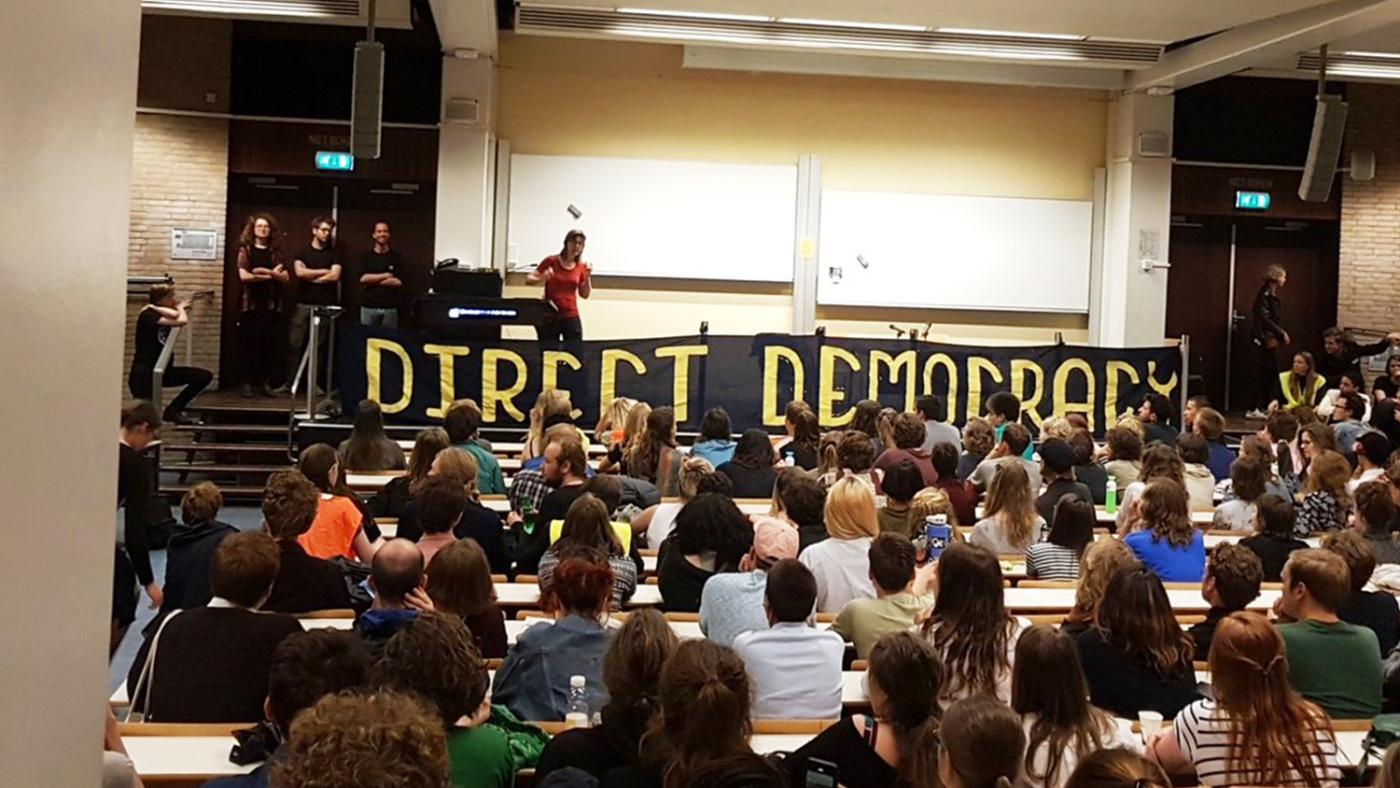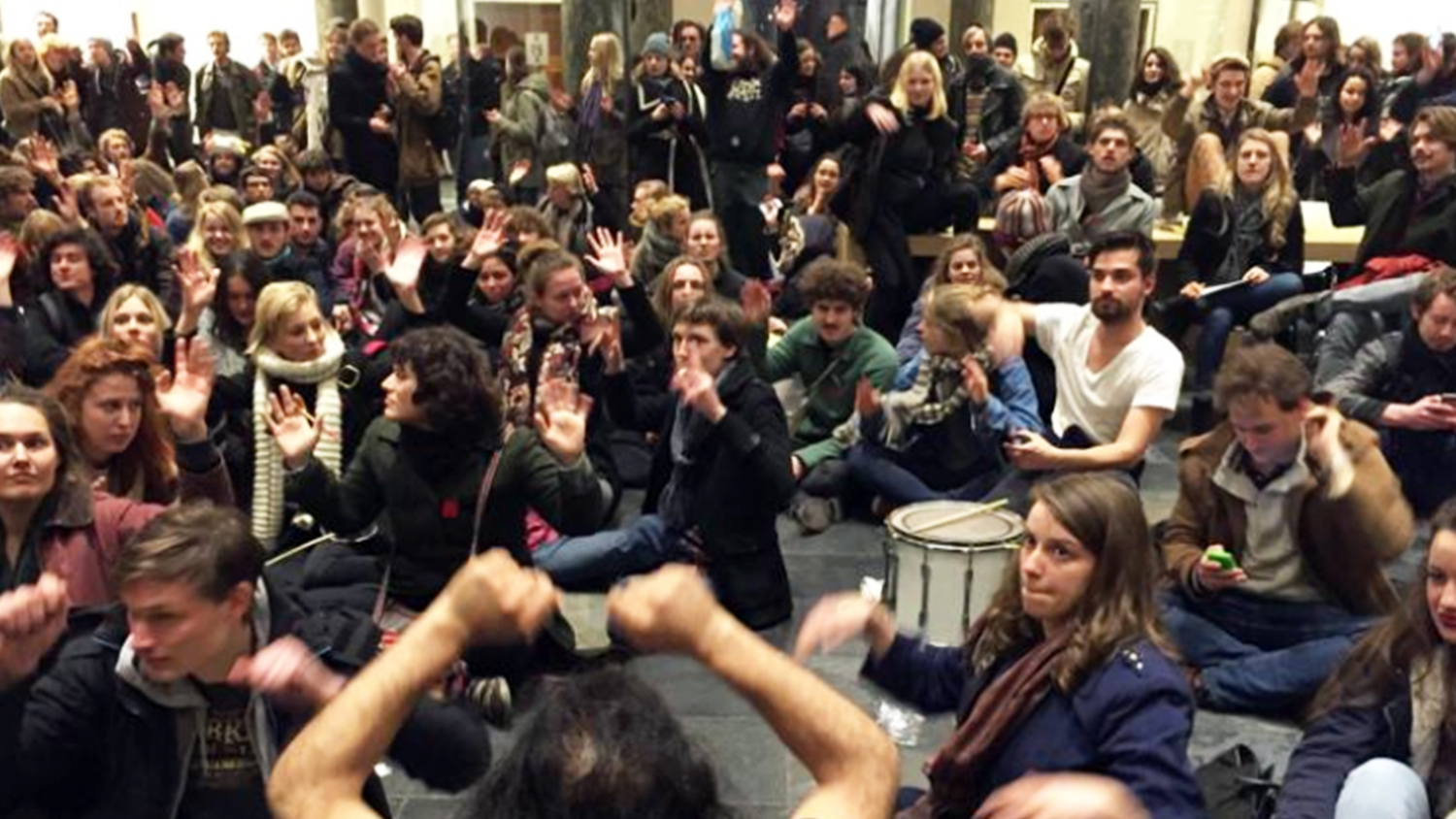Five years after the occupation of the Maagdenhuis

In the evening of February 25, 2015, a group of two to three hundred protesters entered the iconic administration hall of the University of Amsterdam (UvA). “More participation, more democracy,” their banners said. They also demanded more money for small study programmes, and less emphasis on profitability.
It became the longest Maagdenhuis occupation ever. For over six weeks, a group of around thirty protesters camped out on sleeping mats in the offices and meeting rooms. Lectures and debates were organised, the mayor visited, and the Amsterdam student union brought vegetarian couscous. UvA president Louise Gunning resigned – to the joy of the protesters – and after the building was cleared, the university received an invoice for over half a million euros worth of damages.
The question is what’s become of the protesters’ demands now, five years later – not just in Amsterdam, but in all higher education. Have they achieved anything?
Co-determination mainly exists to legitimise the board’s policy
As amiable as the atmosphere had been in the Maagdenhuis, the situation in Parliament after clearing out the building was all the more ferocious. A right-wing majority claimed the occupants were a disgrace, and wanted them to pay for the damages. Then-minister Bussemaker feared this would cause ‘unrest’, and preferred to leave things up to the insurance agency.
A few months after the occupation, she submitted the Strengthening of Management Capacity Act. This had little to do with the Maagdenhuis: the act was a response to administrative mismanagement in vocational education (mbo). From then on out, co-determination was allowed to have input on appointing administrators. Bussemaker rejected the notion of right of assent on the contents of study programmes.
Student organisations loudly voiced their disappointment. “Minister isn’t listening to #maagdenhuis and is barely changing anything,” tweeted the Amsterdam student union. The Dutch National Students’ Trade Union (LSVb) and the Inter-City Student Consultation (ISO) wanted more rights of assent, and felt the Act was “a missed opportunity”.
That year, teachers and students had received the right of assent on the main concepts of the annual budget. But: this had been a part of the deal about abolishing study financing in 2014. It had nothing to do with the Maagdenhuis.
A year of co-determination looks good on your CV. But are those the people who deserve your vote?
 Maagdenhuis occupation 2015. Photo: Twitter.
Maagdenhuis occupation 2015. Photo: Twitter.
Leiden-based historian of education and policy Pieter Slaman also says the Maagdenhuis occupation led to precious little improvement for co-determination. “Councils are still only allowed to voice their opinions after the fact on what they feel about the policies developed by the executive board.”
For that reason, Slaman feels like meetings between the co-determination councils and the Executive Board aren’t exactly thrilling. “There’s always a planning meeting behind closed doors, and the moment decisions are made, many things have already been set in stone.”
“Since 2015, institutions have been pretending there’s more participation, but in fact, there isn’t,” says activist and former LSVb president Geertje Hulzebos. “Co-determination mainly exists to legitimise the board’s policy. With advice they can simply choose to ignore.”
As a student, Hulzebos – who’d been chairperson of her faculty council – says it’s disappointing more and more candidates come from the ‘suit mafia’. “Educational institutions have become degree factories, and a year of co-determination looks good on your CV. But are those the people who deserve your vote?” The Maagdenhuis occupants, she says, preferred a direct democracy, in which everyone who wants to have a say, can have it.
Never the three shall meet
In the late 90’s, new regulations were established in the Netherlands to make universities resemble corporations more. This caused more pressure: to increase profitability, students had to progress through their study programme at a faster pace. Workload pressure increased, and small study programmes became endangered.
It’s that corporation culture that caused enormous anger in 2015. “On the one side, there were teachers who were incredibly passionate about science and the students fighting for the importance of their study programme,” says historian Slaman. “On the other side, there was a board that was doing its best to increase profitability.”
Is any of this any different now, five years later? No, Slaman thinks. “And that wouldn’t have been possible either. Because scientists are and will remain specialists, students fight for their own best interests, and a board has the job of running a university as efficiently as possible. Never the three shall meet. But that’s all right, because it’s that friction that ensures that sometimes, progress is made.”
It proves yet again that the Maagdenhuis is still occupied by administrators and managers
Even at the UvA, not much has come of the Maagdenhuis occupants’ democratisation plans, even though the new board enthusiastically started working on them. An experiment, started in 2018, with a ‘university forum’ consisting of over seventy UvA students and employees – for the largest part appointed by a draw – didn’t yield much.
After the occupation, the UvA board also added a student member. But when a vacancy was published for the position this year, zero people applied.
Despite of all calls for more participation, the average turnout for co-determination elections at universities is also ever-decreasing, sometimes below 30 percent. Sometimes, there aren’t even enough candidates, and elections are cancelled entirely. “If co-determination boards had more influence, those turnout percentages would be much higher,” thinks GroenLinks congresswoman Lisa Westerveld, former president of the LSVb. “Because why vote if it doesn’t matter anyway? It’s time institutions take their students and employees seriously and offer true participation.”
We’re not going to occupy the building again
For the five-year anniversary of the occupation, a group of former Maagdenhuis occupants wants to get together on February 28, to reflect and look ahead. No better place to do so than the hall of the Maagdenhuis, they thought. But the UvA refuses to make the location available to them.
Geertje Hulzebos is the person behind the initiative for the event, and thinks it’s all disappointing. “It really shows their level of distrust. I worked on this for weeks, emailing and talking to countless people. We submitted our programme, and even explicitly stated: we’re not going to occupy the building again, it’s really going to be a positive event.”
It was all for nought – despite the board promising in 2015 that it would keep the Maagdenhuis hall available for debate. Hulzebos says the board doesn’t want to attend the reunion either. “It proves yet again that the Maagdenhuis is still occupied by administrators and managers. As a student, you’re not even allowed to use the bathroom.”
Finally, the funding model is being looked at critically
Has everything really been for nothing, then? Definitely not. Because since the Maagdenhuis occupation, a lot more attention is paid to the complaints made by scientific and supporting staff. About the large number of temporary contracts, for example, or the high workloads and the lack of balance in science funding.
What really got the ball rolling was when UvA professor of digital humanities Rens Bod launched an online petition in 2017. Higher education was bursting at the seams, and needed more money instead of less – as had been happening in social sciences and humanities.
The petition was signed by over five thousand people, as well as the establishment of the hashtag #WOinActie (Higher Education in Action, ed.). In 2018, more than a thousand teachers, researchers, and students travelled to The Hague to protest the ‘degradation’ of higher education and research. Last year, hundreds of scientists and students came together in Leiden for the same reason.
Now, the minister can’t ignore the staff
WOinActie has become an established national protest movement. “That’s where things have truly happened since the occupation of the Maagdenhuis,” Slaman says. “You may speak of a cultural shift, in which the university staff talks about what’s not going right, for the first time. As a university, these days you cannot get away with saying: ‘I’m going to let a PhD candidate do this work for half the money.’ That’ll get you directly reprimanded on Twitter.”
Congresswoman Westerveld can attest from her own experience to the fact that employees speak up a lot more these days. “When I was president of the LSVb ten years ago, our board would meet with just the VSNU and the Association of Universities of Applied Sciences. It was quite hard for us to compete with them, it felt like fighting a big brother. There were many times when I thought: where are the teachers? Now, the minister can’t ignore the staff anymore.”
Hulzebos also thinks WOinActie is “an incredibly good club”. She does fear that administrators use the protest group to take the wind out of the sails of opponents. “It’s repressive tolerance,” she warns. “Many boards are now saying: ‘Look, we’re completely on your side, because we also support WOinActie.’ That knocks your protests dead immediately.”
It’s the fate of the underdog. You have to keep fighting
In politics, the protest movement also garners a lot of support. Even minister Van Engelshoven acknowledges there’s friction in higher education, and that more money is necessary. She wants less competition and more collaboration, and supports the idea that scientists will be assessed for more than just their research achievements.
A good development, Westerveld thinks. “There’s still a long way to go, but I’m happy the minister sees we should remove the profit-based thinking from higher education. She’s even mentioned multiple times that she’s looking for a billion euros. That’s quite the quote. It’s uncertain whether she’ll manage it, but at least she’s feeling the urgency.”
That urgency started in the Maagdenhuis. And even if it doesn’t work, there’s no doubt that new student protests will follow, Westerveld says. “Every few years, students speak up. That’s the only way. It’s the fate of the underdog. You have to keep fighting to make sure no one takes away your rights.”
Now, the funding model is finally being looked at critically
Historian Slaman is a little more pessimistic. “The minister says she wants to save small study programmes, but at the same time, I see her steal money from Social Sciences and Humanities to give the Science programmes a boost.”
Slaman does think it’s a step in the right direction that Van Engelshoven wants to make higher education less dependent on student numbers. “Thanks to the cultural shift that’s been happening since 2015, the funding model is finally being looked at critically.”
“That’s been the real power of the Maagdenhuis occupation,” activist Hulzebos concludes. “The fundamental questioning of the current educational system. Whether you were a professor, a student, or an advisor: you were welcome and your opinion mattered. We’re reaping the benefits of that now. I’m certain we’ll still be talking about this in twenty years.”
Five years ago wasn’t the first time students demanded more participation. In the late 1960’s, many students protested for the same cause. On May 16, 1969, this led to the first occupation of the Maagdenhuis, which was forcefully ended by police after five days.
The protests were not for nothing: a year later, the participation of students and employees was formally established in the Bill of Educational Reform (WUB). University councils became administrative bodies and were officially allowed to have a say in everything happening at the university.
This was democratic, but not necessarily very efficient. After all, any executive board would now need approval from the university council for nearly every single plan. In 1997, most of the obtained rights were abolished with the introduction of the Modernisation of University Managerial Organisation Act (MUB). Councils at universities and universities of applied sciences became co-determination councils: they were no longer allowed to co-manage, but only had the right to assent or advise.